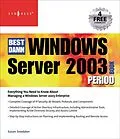In keeping with past trends, full migration to this latest Microsoft Server Operating System will begin in earnest 12 months after its release, in mid-to-late 2004. This book will hit the market just as large enterprises begin the process of moving from Windows 2000 Server to Windows Server 2003. The title says everything you need to know about this book. No other book on the market combines this breadth and depth of coverage with the kind of product expertise and quality standard expected from Syngress. Every aspect of Planning, Installing, Configuring and Troubleshooting a Windows Server 2003 network is distilled and documented, with plenty of examples and illustrations. An unlike its competition, this is a book that was written from the ground up for Windows Server 2003.
* Everything a System Administrator will ever need to know about running a Windows Server 2003 network.
* This is the book that meets the needs of today's Windows Server 2003 professional.
* Every aspect of Planning, Installing, Configuring and Troubleshooting a Windows Server 2003 network is distilled and documented, with plenty of examples and illustrations.
Autorentext
Debra Littlejohn Shinder is a technology consultant, trainer and writer who has authored a number of books on computer operating systems, networking, and client and server security over the last fourteen years. These include Scene of the Cybercrime: Computer Forensics Handbook, published by Syngress, and Computer Networking Essentials, published by Cisco Press. She is co-author, with her husband, Dr. Thomas Shinder, of the best-selling Configuring ISA Server 2000, Configuring ISA Server 2004, and ISA Server and Beyond.
Deb has been a tech editor, developmental editor and contributor on over 20 additional books on networking and security subjects, as well as study guides for Microsoft's MCSE exams, CompTIA's Security+ exam and TruSecure's ICSA certification. She formerly edited the Element K Inside Windows Server Security journal. She authored a weekly column for TechRepublic's Windows blog, called Microsoft Insights and a monthly column on Cybercrime, and is a regular contributor to their Security blog, Smart Phones blog and other TR blogs. She is the lead author on Windowsecurity.com and ISAServer.org, and her articles have appeared in print magazines such as Windows IT Pro (formerly Windows & .NET) Magazine. She has authored training material, corporate whitepapers, marketing material, webinars and product documentation for Microsoft Corporation, Intel, Hewlett-Packard, DigitalThink, GFI Software, Sunbelt Software, CNET and other technology companies.
Deb specializes in security issues, cybercrime/computer forensics and Microsoft server products; she has been awarded Microsoft's Most Valuable Professional (MVP) status in Enterprise Security for eight years in a row. A former police officer and police academy instructor, she has taught many courses at Eastfield College in Mesquite, TX and sits on the board of the Criminal Justice Training Center there. She is a fourth generation Texan and lives and works in the Dallas-Fort Worth area.
Inhalt
Foreword
Chapter 1 Overview of Windows Server 2003
Introduction
Windows XP/Server 2003
What's New in Windows Server 2003?
New Features
The Windows Server 2003 Family
Why Four Different Editions?
Members of the Family
Licensing Issues
Product Activation
Installation and Upgrade Issues
Common Installation Issues
Common Upgrade Issues
Windows Server 2003 Planning Tools and Documentation
Overview of Network Infrastructure Planning
Planning Strategies
Using Planning Tools
Reviewing Legal and Regulatory Considerations
Calculating TCO
Developing a Windows Server 2003 Test Network Environment
Planning the Test Network
Documenting the Planning and Network Design Process
Creating the Planning and Design Document
Chapter 2 Using Server Management Tools
Introduction
Recognizing Types of Management Tools
Administrative Tools Menu
Custom MMC Snap-Ins
Command-Line Utilities
Wizards
Windows Resource Kit
The Run As command
Managing Your Server Remotely
Remote Assistance
Using Web Interface for Remote Administration
Remote Desktop for Administration
Administration Tools Pack (adminpak.msi)
Windows Management Instrumentation (WMI)
Using Computer Management to Manage a Remote Computer
Which Tool To Use?
Using Emergency Management Services
Managing Printers and Print Queues
Using the Graphical Interface
Using New Command-Line Tools
The Printer Spooler Service
The Internet Printing Protocol
Using the Graphical Interface
Using New Command-Line Utilities
Using Wizards to Configure and Manage Your Server
Using the Configure Your Server Wizard and Manage Your Server
Chapter 3 Planning Server Roles and Server Security
Introduction
Understanding Server Roles
Domain Controllers (Authentication Servers)
File and Print Servers
DHCP, DNS, and WINS Servers
Web Servers
Database Servers
Mail Servers
Certificate Authorities
Application Servers and Terminal Servers
Planning a Server Security Strategy
Choosing the Operating System
Identifying Minimum Security Requirements for Your Organization
Identifying Configurations to Satisfy Security Requirements
Planning Baseline Security
Customizing Server Security
Securing Servers According to Server Roles
Chapter 4 Security Templates and Software Updates
Introduction
Security Templates
Types of Security Templates
Network Security Settings
Analyzing Baseline Security
Applying Security Templates
Software Updates
Install and Configure Software Update Infrastructure
Install and Configure Automatic Client Update Settings
Supporting Legacy Clients
Testing Software Updates
Chapter 5 Managing Physical and Logical Disks
Introduction
Working with Microsoft Disk Technologies
Using Disk Management Tools
Using the Disk Management MMC
Using the Command-Line Utilities
Managing Physical and Logical Disks
Managing Basic Disks
Managing Dynamic Disks
Optimizing Disk Performance
Defragmenting Volumes and Partitions
Configuring and Monitoring Disk Quotas
Implementing RAID Solutions
Understanding and Using Remote Storage
What is Remote Storage?
Storage Levels
Relationship of Remote Storage and Removable Storage
Setting Up Remote Storage
Troubleshooting Disks and Volumes
Troubleshooting Basic Disks
Troubleshooting Dynamic Volumes
Troubleshooting Fragmentation Problems
Troubleshooting Disk Quotas
Troubleshooting Remote Storage
Troubleshooting RAID
Chapter 6 Implementing Windows Cluster Services and Network Load Balancing
Introduction
Making Server Clustering Part of Your High-Availability Plan
Terminology and Concepts
Cluster Models
Server Cluster Deployment Options
Server Cluster Administration
Recovering from Cluster Node Failure
Server Clustering Best Practices
Making Network Load Balancing Part of Your High-Availability Plan
Terminology and Concepts
Relationship of NLB to Cl…
